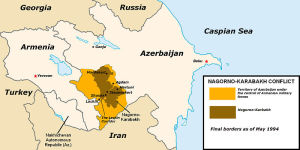Tajikistan and Azerbaijan Brought Closer by Common Stance on Nagorno-Karabakh
 As part of a three-day official visit to Dushanbe (Tajikistan), Azerbaijan’s president Ilham Aliyev signed a Joint Declaration with Tajikistan’s president Emomali Rahmon. A formal welcoming ceremony was held at the Palace of Nations in the Tajik capital, with a guard of honor arranged for the head of state. The declaration emphasized the "inadmissibility of changing internationally recognized borders” as a way to counter potential threats to their territorial integrity, a hint to the difficult relations Azerbaijan has with its southwestern neighbor, Armenia. They also stressed “an urgent necessity to peacefully settle the Armenian-Azerbaijani conflict over Nagorno-Karabakh," a disputed territory located in Azerbaijan but mainly populated by Armenians.
As part of a three-day official visit to Dushanbe (Tajikistan), Azerbaijan’s president Ilham Aliyev signed a Joint Declaration with Tajikistan’s president Emomali Rahmon. A formal welcoming ceremony was held at the Palace of Nations in the Tajik capital, with a guard of honor arranged for the head of state. The declaration emphasized the "inadmissibility of changing internationally recognized borders” as a way to counter potential threats to their territorial integrity, a hint to the difficult relations Azerbaijan has with its southwestern neighbor, Armenia. They also stressed “an urgent necessity to peacefully settle the Armenian-Azerbaijani conflict over Nagorno-Karabakh," a disputed territory located in Azerbaijan but mainly populated by Armenians.
The Nagorno-Karabakh conflict is a frozen war between Azerbaijan and Armenia over a territory the size of Delaware located in Azerbaijan but mainly populated by Armenians and consists the major point of contention between the two countries. Sporadic clashes have
occurred since the ceasefire of 1994 which ended a six-year war responsible for 30,000 deaths. However, in August of this year, fifteen soldiers were killed, twelve of which Azeri, raising the prospect of further destabilization in the Caucasus. NATO has reaffirmed its support for the territorial integrity of Azerbaijan. Armenia also has a portion of its territory, the Nakhchivan Autonomous Republic, mainly populated by Azeris.
Support was also given to the development of mutual economic, trade, transportation, and military cooperation. The two countries already cooperate in the fields of law enforcement, counterterrorism as well as drug and weapon trafficking. Initiatives in the transport sector include the opening of a new international sea port in Azerbaijan as well as the construction of the railway Baku-Tbilisi-Kars to be completed in 2015. They also expressed the willingness to resume direct flights between Dushanbe and Baku. In addition, the two countries signed an agreement on cooperation in the field of healthcare, as well as an agreement on scientific cooperation between the Azerbaijan National Academy of Sciences and the Tajik Academy of Sciences. Tajikistan hopes for increased Azeri investments in the construction of hydropower facilities and in the natural resources industry of Tajikistan.
Azerbaijan and Tajikistan, both former Soviet republics, established diplomatic relations on 29 May 1992. They are both members of the Commonwealth of Independent States (CIS) formed in 1991 but are not part to the related free trade agreement (CISFTA) of 2011. Currently, the Tajik-Azeri legal base consists of more than thirty agreements and treaties, where the Agreement on Friendship and Cooperation of March 2007 is most fundamental. The trade between Azerbaijan and Tajikistan equaled $11 million in the first half of 2014, with Tajikistan purchasing aluminum oxide, coke and other raw materials. In 2012, Azerbaijan’s Azeraluminium and Tajikistan’s TALCO signed a cooperation agreement. Both countries are interested in the revival of the Great Silk Way within the TRACECA (Transport Corridor Europe-Caucasus-Asia) project. TRACECA is an international transport programme, established in 1993, involving the European Union and 14 States of Eastern Europe, the Caucasus and Central Asia. The Permanent Secretariat of Intergovernmental Commission of TRACECA is located in Baku, Azerbaijan.
This Joint Declaration in October comes at a point when Tajikistan is stepping up its partnerships with different regional actors: it signed ten agreements with Iran in September as well as a defense agreement with Kazakhstan, a cooperation agreement with Kyrgyzstan and seventeen agreements with China in that same month, a cooperation agreement with Russia in October. Less active than Tajikistan, Azerbaijan has been reaching out to actors outside of Central Asia in the last few months, a research agreement with Argentina as well as a cooperation agreement in the energy field with Malaysia in September and two security cooperation agreements signed with Qatar in October.
The two countries have appealed to powers in the region in order to defend their position. While Azerbaijan has turned to Georgia, Turkey, Israel and the US, Armenia registered the support of Iran and Russia. The conflict was also a key element in designing the routes of the Baku-Tbilisi-Ceyhan (BTC) oil pipeline and Baku-Tbilisi-Erzurum (BTE) gas pipeline, both circumventing Armenia in bringing Caspian energy resources to Europe. On its end, Tajikistan has boundary disputes with two of its neighbors, Uzbekistan and Kyrgyzstan. The development of strong ties with Tajikistan is another step taken by Azerbaijan in its long-standing opposition to Armenia.
